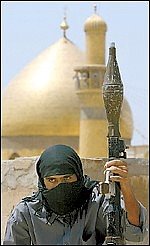Sources: Sadr seeking better control of Mahdi Army, orders followers to lay down arms
 A Mahdi Army member in position near the Shrine of Imam Ali
A Mahdi Army member in position near the Shrine of Imam AliBAGHDAD, Iraq - Muqtada al Sadr, the firebrand Shiite Muslim cleric whose Mahdi Army is arguably Iraq's most powerful armed group, has ordered his followers to put down their weapons temporarily, three of his aides told McClatchy Newspapers on Friday.
Analysts differed on the significance of the directive, which Sadr delivered in secret to his commanders two weeks ago in the southern city of Kufa. Some saw it as Sadr's way of distancing himself from rising sectarian violence, most of which has been blamed on his followers.
Others said the order was little more than an effort by Sadr to head off an offensive by American and Iraqi forces against his militia, which increasingly is seen as a shadow sectarian security force. Controlling many of Iraq's larger cities, the Mahdi Army uses its political hold on several government ministries to win new supporters.
"The American and the Iraqi governments are starting to feel how powerful he is getting. It's obvious that both of them are fed up," said Mithal Alusi, a secular Shiite member of parliament. "That's why the Sadrists are playing a tactical game: to quiet the attacks and buy time."
Whichever view is correct, Sadr's directives suggest that his organization is feeling pressure to curb the violence between Shiites and their Sunni Muslim rivals. U.S. officials have blamed Sadr for much of the killing and have pledged to move against his forces.
Iraqi army troops clashed with Mahdi Army members last month in Diwaniya, and tensions have been rising with U.S. troops, who earlier this month detained Sadr supporters meeting in Najaf. American troops fought pitched battles with Sadr's forces twice in 2004. Both times, Sadr's forces took heavy casualties but the cleric survived, and his militia grew stronger.
Now many think the Mahdi Army controls security in much of Iraq through death squads and its infiltration and intimidation of Iraqi security forces. Sadr's political supporters are influential with Prime Minister Nouri al Maliki, who won his post through the backing of Sadr, who controls the largest voting bloc in the parliament.
Analysts also think that Sadr is having trouble controlling his organization. Some militant members have criticized him for joining the political process last year, accusing him of straying from his pledge to reject the American-created government and rid Iraq of foreign forces. A senior U.S. military official said earlier this week that at least six former Mahdi Army leaders no longer answered to Sadr.
Those leaders now are members of rival groups that are competing for power, popularity and funding from the same sources as Sadr.
"What you do see over time is that you'll see guys, who, for whatever reason, become motivated to become more militant, and the militant elements find the political framework confining," the U.S. military official said, speaking only on condition of anonymity because he was giving confidential information. "I'll tell you as time goes on, you're going to continue to see elements break off the organization and become sort of these semi-independent or independent players, but none of them remain independent for long. They all find a sponsor."
Regaining control may be one reason that Sadr issued his four-point mandate orally to his commanders. According to three top Sadr aides, who agreed to discuss the meeting only if they weren't identified because it had been secret, Sadr told the commanders to:
-Reduce the size of units to 75 fighters from as many as 400, to make the units more manageable.
-Issue new identification cards to Mahdi Army members to replace IDs that have been forged.
-Send every member to an orientation course that would outline the group's mission.
-Lay down weapons temporarily.
The last directive is intended to flush out armed groups who say they're part of the Mahdi Army but in fact don't answer to Sadr. No armed operation is to be undertaken, the aides said, without Sadr's permission.
"As long as we don't have orders, we can't do anything. The Mahdi Army will be known as only fighting the Americans," a top Mahdi Army leader in Kufa said Friday.
It remains to be seen whether Sadr's directive will be followed.
Read the rest at the San Jose Mercury News
Related Link:
U.S. Envoy Says Iraqi Premier Has Short Time to Quell Violence
Related Link:
Commander Urges Disarming Iraq Militias
Related Link:
U.S.: al-Sadr losing control of Mahdi Army
Related Link:
U.S. says Iran buys Iraq militia with arms, cash
Related Link:
U.S.: Sadr City Again a Militants' Haven
Related Link:
Sunni, Shiite factions carve up Baghdad

<< Home